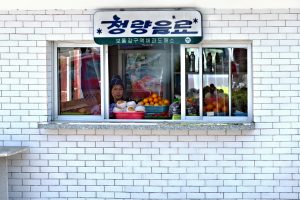According to the 2024 Bertelsmann Transformation Index, published by the German research institute Bertelsmann Stiftung, North Korea ranks 131st out of 137 countries in terms of democratic and market economy transformation. Only six countries trail behind: Sudan, Myanmar, Somalia, Eritrea, Syria, and Yemen.
The report notes a lack of market-friendly reforms or liberalization in North Korea. Experts like Marcus Noland have long warned about the government’s efforts to maintain control over the country’s market system.
However, recent developments suggest a shift in approach. With COVID-19 now classified as endemic by North Korean authorities, the state of markets has evolved. Daily NK sources report that while markets remain regulated to varying degrees across regions, authorities appear focused on stimulating rather than shutting them down, likely as a means to raise funds.
For instance, in January, some areas implemented a policy limiting markets to operating only 15 days per month. This measure, however, has not been uniformly applied nationwide. Many regions, including Pyongyang, continue to operate without such restrictions, indicating a nuanced approach to market management across the country.
In Pyongyang, markets continue to serve as the nexus of both official and unofficial economic activity. Recent reports suggest an increased emphasis on their role, with officials intensifying efforts to raise government funds through increased market fees, effectively functioning as taxes.
Authorities in some areas appear to be gradually easing restrictions on street vendors. For instance, a ban on street sales was lifted in mid-February. Vendors are generally left undisturbed as long as they avoid selling prohibited items. Consequently, Daily NK sources have reported a noticeable increase in street vendors operating in market-adjacent alleys and popular corners across various parts of North Korea, conducting business without fear of enforcement action.
This shift in policy seems to stem from the realization that even street vendors can contribute to government coffers. The strategy appears to involve relaxing restrictions to enable the collection of market fees from street vendors, rather than outright prohibition of the practice.
These measures likely reflect North Korean leader Kim Jong Un’s concerns about the lagging regional economy. One source stated, “The party committee ordered the relaxation of controls on street sales as a response to the growing number of families facing food and financial insecurity in the provinces.”
This approach represents a nuanced shift in North Korea’s economic management, potentially indicating a pragmatic adaptation to economic realities while maintaining overall state control.
What’s more, North Korean authorities have recently begun processing applications for the registration of market stalls and commercial stores nationwide. Prospective business owners are required to submit application and registration fees, along with detailed business plans outlining their intended products or services. This comes with the promise of being allowed to operate larger businesses, provided they continue to pay the necessary fees. Information about this process has been disseminated through city and county people’s committees, neighborhood offices, and the Socialist Women’s Union of Korea.
While annual registration renewal for market stalls and commercial stores typically occurs in March or April, the issuance of new permits for stalls or stores marks a departure from usual practice. This unusual move has sparked skepticism among many North Koreans. Rather than viewing it as an attempt to improve economic conditions through expanded business opportunities, many perceive it as a thinly veiled effort to generate additional funds for regional factory construction.
The prevailing sentiment is that authorities aim to extract fees and taxes from these newly approved stalls and stores. This initiative appears to align with the broader 20×10 regional development policy, a flagship program introduced by Kim Jong Un. The strategy suggests a proactive approach by North Korean authorities to utilize markets as a revenue-generating tool for government initiatives.
That said, incorporating the markets into the state-run economy would still seem to be a long way off. North Korean officials on the ground do not think the government has enough funds to smoothly produce, distribute, and sell products on its own. Even the state-run grain stores do not have enough product in stock to last a month. Their stock reportedly often lasts for just two days, or four days at the most.
Assessing North Korea’s evolving market situation presents several challenges. Given that market policies are subject to regional variations and periodic updates, a systematic and regular review of these changes is essential. A comprehensive assessment of the North Korean authorities’ market management policy requires careful analysis of several factors: 1) changes in market hours and their correlation with government policy; 2) updates to lists of prohibited items; 3) adjustments in market fees and 4) modifications to market operating regulations.
Moreover, as North Korean authorities attempt to increase the state-run economy’s role in markets, it’s crucial to investigate trends in the production and distribution of market goods. This data, combined with research on the extent of nationalization among goods producers, could provide valuable insights into the relative proportions of private and public economic activity in North Korea.
From the perspective of North Korean citizens, developing a strategy to reinvigorate markets is vital. While markets continue to play a crucial role in meeting basic needs, they have lost much of their pre-pandemic vibrancy. Analyzing the factors behind this market contraction and collaborating with North Koreans to find solutions is imperative.
Ultimately, our goal should be to enable North Koreans to lead lives of dignity and economic stability. This requires a nuanced understanding of the country’s complex market dynamics and a commitment to developing strategies that can improve economic conditions within the constraints of the current system. As we move forward, this focus on enhancing the quality of life for North Korean citizens through market revitalization and economic development remains paramount.
































